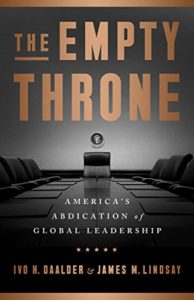 For 70 years, Western allies shared a commitment to democracy, freedom, and human rights and a belief that advancing them globally was an essential contribution to international peace and prosperity, argue Ivo H. Daalder and James M. Lindsay, co-authors of a forthcoming book, “The Empty Throne: America’s Abdication of Global Leadership.” The major allies of the United States can leverage their collective economic and military might to save the liberal world order, they write for Foreign Affairs.
For 70 years, Western allies shared a commitment to democracy, freedom, and human rights and a belief that advancing them globally was an essential contribution to international peace and prosperity, argue Ivo H. Daalder and James M. Lindsay, co-authors of a forthcoming book, “The Empty Throne: America’s Abdication of Global Leadership.” The major allies of the United States can leverage their collective economic and military might to save the liberal world order, they write for Foreign Affairs.
The G-9 – France, Germany, Italy, the United Kingdom, and the EU in Europe; Australia, Japan, and South Korea in Asia; and Canada in North America – can start by taking the lead in international institutions, such as the UN and the World Bank, and must speak up loudly, clearly, and in unison in favor of democracy and freedom wherever and whenever these are challenged.
 It is true, as the critics say, that the United States was not always a consistent supporter of democracy, notes Robert Kagan, a senior fellow at the Brookings Institution. Although it actively promoted democracy in Japan, Germany and Western Europe in the early postwar years, and in Eastern Europe and other parts of Asia in the 1980s and 1990s, there were large parts of the world where the United States was indifferent or even hostile to democracy, he writes for POLITICO.
It is true, as the critics say, that the United States was not always a consistent supporter of democracy, notes Robert Kagan, a senior fellow at the Brookings Institution. Although it actively promoted democracy in Japan, Germany and Western Europe in the early postwar years, and in Eastern Europe and other parts of Asia in the 1980s and 1990s, there were large parts of the world where the United States was indifferent or even hostile to democracy, he writes for POLITICO.
Yet in the end, and even if not always deliberately or consciously, the United States did shape a world unusually conducive to the spread of democracy, adds Kagan, author of The Jungle Grows Back: America and Our Imperiled World, suggesting that the transformation of the once predatory dictatorships of Japan and Germany into anchors of liberal economic and political order may alone have been the greatest stimulus to the explosion of democracy of the past half century:
 It made Europe and East Asia, once the world’s cockpits of nationalist confrontations, into zones of relative peace, prosperity and stability, and that in turn reduced one of the greatest obstacles to democracy: insecurity. Nations that are perpetually concerned with defending themselves against attack generally produce strong central governments and often hand extraordinary powers to their leaders. By creating conditions of general security in the decades after World War II, the liberal order provided a cushion for young democracies that might not have survived in a more dangerous world.
It made Europe and East Asia, once the world’s cockpits of nationalist confrontations, into zones of relative peace, prosperity and stability, and that in turn reduced one of the greatest obstacles to democracy: insecurity. Nations that are perpetually concerned with defending themselves against attack generally produce strong central governments and often hand extraordinary powers to their leaders. By creating conditions of general security in the decades after World War II, the liberal order provided a cushion for young democracies that might not have survived in a more dangerous world.
“It mattered, too, that the strongest power in the world was itself a democracy,” notes Kagan. “Those wishing to live under the umbrella of the liberal order’s protection generally sought to conform themselves to its values and mores.”
Liberal democracies are threatened externally by authoritarian resurgence but also from within by divisive identity politics, Stanford University’s Francis Fukuyama tells The Economist.







